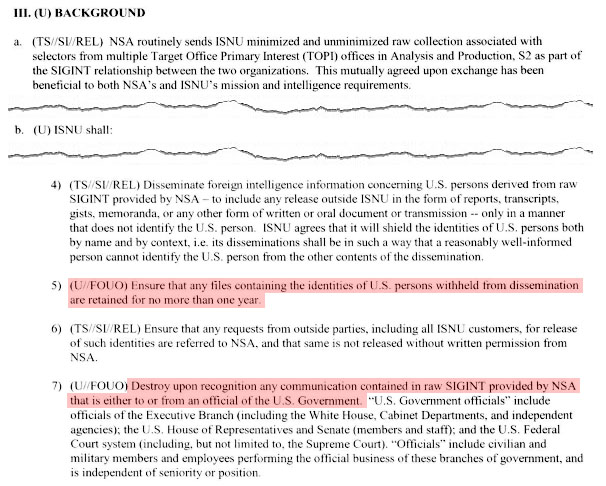Another day, another Snowden document released by the Guardian. But this one involves Israeli intelligence, which should guarantee an extra frisson of outrage, especially given the context: starting in 2009, the NSA began to routinely hand over raw data—some of which includes surveillance of U.S. citizens—to the Israeli SIGINT National Unit (INSU).
The memo that confirmed this arrangement is crystal clear that Israeli use of NSA data must be “consistent with the requirements placed upon NSA by U.S. law and Executive Order to establish safeguards protecting the rights of U.S. persons under the Fourth Amendment to the United States Constitution.” There follow numerous paragraphs setting out the rules of the road, which basically say that Israel isn’t permitted to use this data to target U.S. persons in any way. Whether this comforts you probably depends on whether you think Israel takes these rules seriously, or whether it was strictly a wink-wink-nudge-nudge sort of arrangement, where everyone knows perfectly well that once it has its hands on this stuff the Israelis will use it any way they please. It’s not as if they’re famous for their reluctance to spy on Americans, after all. In fact, another document seen by the Guardian noted that “A NIE [National Intelligence Estimate] ranked them as the third most aggressive intelligence service against the US.”
As for me, I’m just going to straight-up admit that this stuff is coming too fast and furious for me to truly digest it all. On the one hand, it’s not as if it comes as any surprise that we share intelligence with friendly countries. On the other hand, raw, unminimized intelligence? With a country whose previous efforts to spy on America are pretty well known? I honestly have no idea how seriously to take the promises in this memo that NSA’s raw data will never, ever be used to target Americans, cross our hearts and hope to die. I wonder if NSA deliberately inserts test cases in the data they hand over just to find out if INSU reports them back, as they’re supposed to?
For now, then, I’ll just highlight the part of the memo below. Note that Israel is allowed to hold files that contain the identities of U.S. persons for a year. But files that contain the identities of government officials? Incinerate on contact and salt the earth behind them. Priorities, priorities.


















